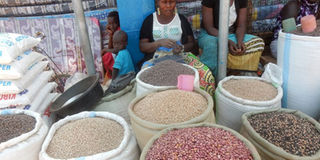Law fails to protect farmers

Women prepare to sell grains in Lira Town market on Monday. The district has come up with an Ordinance to fight fake seeds. PHOTO BY BILL OKETCH
What you need to know:
- After planting, the seeds failed to germinate.
- Many farmers do not know what to grow, when to plant the crop, where to buy the seeds from and how to deal with harvests.
A farmer from Barr Sub-county in Lira District, Ms Dorcus Auci, bought four packets of sunflower seeds from an agro-input dealer in Lira Town at Shs100,000 in February 2017.
After planting, the seeds failed to germinate.
Around August 2017, Ms Auci again bought sorghum seeds from another input dealer in Lira Town but they failed to germinate. This is the dilemma that many farmers in Lira face because of fake and counterfeit agro-inputs.
The Lira Resident District Commissioner, Mr Robert Abak, acknowledges that farmers have been suffering in the hands of unscrupulous businesspersons who sell to them fake seeds.
“If you find that the seeds are fake, report the matter to local authorities for immediate action,” he advises.
Lira District passed Fake and Counterfeit Ordinance in October 2017 but critics doubt whether it will actually protect farmers such as Ms Auci against unscrupulous people dealing in fake seeds.
Some critics believe the punishment does not match the crime while others say farmers cannot differentiate between fake and genuine seeds because of ignorance.
“Two currency points (Shs40,000) are not enough. We need 50 currency points (one million) as a punishment,” Lira District chairman, Mr Alex Oremo Alot, says, adding that his administration is much prepared to protect the farmers against counterfeit and fake agro-products.
“We now want to call the input dealers and enter into memorandum of understanding with them, citing regulations and the laws of the Ordinance. We shall also sensitise the farmers so that they don’t buy counterfeit seeds,” he says.
Gaps in implementation
Mr Geoffrey Onen, an official at Facilitation for Peace and Development (FAPAD), says the law has neither been popularised nor enforced.
The acting chief administrative officer, Mr Denis Otim, acknowledges that there are some gaps in the implementation of the regulation.
“The councillors rarely talk about it but people are always offering complaints; you know government has not done this, you know this one has not been done like this,” he says.
There are concerns that many farmers in Lango Sub-region have forgotten all the principles they should have to achieve their objectives. Many farmers do not know what to grow, when to plant the crop, where to buy the seeds from and how to deal with harvests.
However, the Lira District agricultural officer, Ms Dorcus Alum, believes that when farmers are empowered, they will be going in the right direction.
“There are people who are buying grains from Produce Line in Lira Town and then they simply pack in bags and sell as seeds. I have already given some farmers some knowledge to distinguish between seeds and grains,” she says.
Action Against Hunger value chain analysis 2014, indicates that farmers in northern Uganda, who grow maize, soya beans and simsim, face great difficulty in accessing quantity and quality seeds due to high prices and limited availability. Seeds used are usually home saved crops from previous harvest.
The absence of post-harvest handling equipment to improve the quality of the product and lack of knowledge on post-harvest handling and value addition were also some of the problems identified.
In an attempt to address the production challenges in Ogur and Agweng sub-counties in Lira District, Youth for Life Uganda, a community based organisation, is implementing a Village Seed Bank (VSB) project with support from Private Sector Foundation-Uganda.
The project is aimed at addressing the problem of lack of access to quality seeds by breeding and processing the seeds locally. The seeds will be produced by the members, processed and stored at the Village Seed Bank, for easy access.
“It will also address the problem of lack of post-harvest handling equipment by providing tarpaulins for drying the harvest,” the coordinator, Mr Denis Okwir, says.
According to Food and Agriculture Organisation (FAO), food security is dependent on the seed security of farming communities. Seeds are the primary basis for human sustenance. They are the repository of the genetic potential of crop species and their varieties resulting from the continuous improvement and selection over time.
FAO says crop improvement and the delivery of high quality seeds and planting materials of selected varieties to growers is necessary for ensuring improved crop production and meeting growing environmental challenges.
Uganda has come up with a number of seed related legal and policy frameworks such as the Plant Varity Protection Act, 2014, the National Seed and Plant Act, and the draft National Seed policy, among others. The development of these legislations has largely been influenced by forces of globalization which today continue to take centre stage in many aspects of human life and development.
THE ORDINANCE
Enforcement. The ordinance is being enforced concurrently with control of movement and trade on counterfeit and fake agro-inputs and planting material policy 2015, and in compliance with other relevant acts and statutes passed by Parliament.
Offences.
The offences included under the law involve the sale or distribution of quality compromised agricultural products, handling storage, sale or distribution of adulterated or contaminated agro-inputs, distribution or sale of agro-inputs which do not match the recommended specifications, and related offences.
Punishment. According to the law, any person who contravenes any provision of this Ordinance shall be punishable with a fine of two currency points or three months of community service or imprisonment for a period not exceeding six months.




